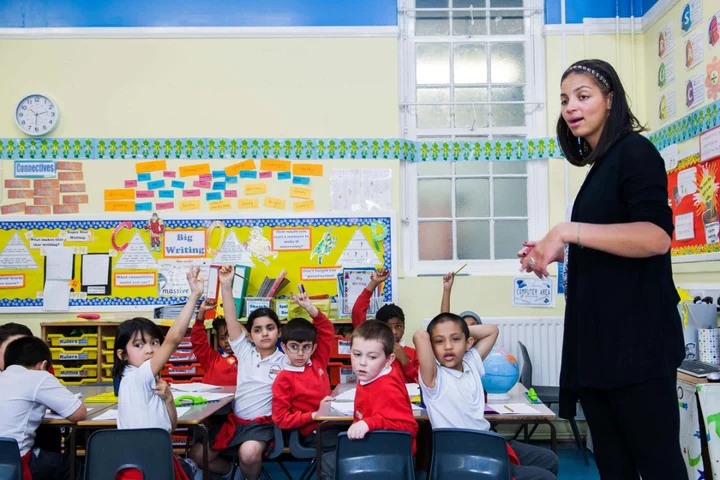
Adam Thomas ‘struggling’ and in ‘pain’ with rheumatoid arthritis ahead of Strictly Come Dancing debut
Adam Thomas has admitted that he’s “struggling” and in “pain” after being diagnosed with rheumatoid arthritis ahead of his appearance on Strictly Come Dancing. The Waterloo Road star is one of the 15 celebrities preparing to put themselves to the test as they compete on the 21st series of dance competition series Strictly. Just days after it was announced that he had joined the cast, Thomas shared on his 35th birthday that he had recently been diagnosed with rheumatoid arthritis. An autoimmune disease, rheumatoid arthritis is a long-term condition that causes pain, swelling and stiffness in the joints. It usually affects the hands, feet and wrists and can cause flare-up periods where symptoms become worse for a period of time. On Sunday (3 September), the former Coronation Street star posted a shirtless selfie to Instagram following a swimming session. Writing in the caption, Thomas said that he was posting the image “to get comfortable feeling uncomfortable”. “Am not in the best shape of my life, but I could be worse,” he wrote. “This year has been tough there’s no doubt about that… but I’ve just got to stay focused now! I’m still struggling and the pain is still there but I’m putting on a brave face I’ve got to stay strong [sic]!” Thomas continued: “Swimming helps me so much with my arthritis, I mean as much as it kills me getting my top off and going for a swim, I know it’s helping me and I know it’s also helping me deal with the issues I’ve got with me and my body. Which is a good thing!” “Got a feeling am going to get a lot more out of the next few months than I bargained for [sic]! Let’s go!” Thomas announced that he had been diagnosed with rheumatoid arthritis last month, explaining that he had “been in a lot of pain since January”. “It started with my knees and then travelled to my wrists, fingers and now ankles and toes,” he wrote. “I never knew what was happening and finally after several blood tests and back and forth to doctors and hospitals, I’ve been diagnosed with rheumatoid Arthritis!” The actor had originally said that he signed up for Strictly – which begins later this month – in order “to be able to move again, get fit and do it, all with a smile on my face”. Strictly Come Dancing returns in September on BBC One. Read More Kanye West and ‘wife’ Bianca Censori banned from Venice boat company after ‘obscenities’ on board Yellowstone season 5: Kevin Costner finally explains why he quit the show Fyre Fest 2.0? Chris Rock and Diplo escape Burning Man festival as 70,000 stranded in desert How to look after your joints, as women experience ‘significantly higher’ pain than men How can parents and children battle back-to-school anxiety? Khloe Kardashian officially changes son Tatum’s last name
2023-09-05 00:19

Top Green Fund Backs Deforestation-Free Crops With $189 Million
The world’s biggest global climate fund has approved a $189 million commitment to &Green facility to support agriculture
2023-09-04 23:55

Peru media guide
An overview of the media in Peru, including links to broadcasters and newspapers.
2023-09-04 23:45

West Virginia University crisis looms as GOP leaders focus on economic development, jobs
West Virginia University is recommending slashing its language department and dozens of other programs amid a $45 million budget shortfall
2023-09-04 23:25

Carol Burnett says Bob Mackie designed 17,000 costumes for The Carol Burnett Show
Carol Burnett says that Bob Mackie designed more than 17,000 looks for 'The Carol Burnett Show' as he made dozens a week.
2023-09-04 23:22

How to look after your joints, as women experience ‘significantly higher’ pain than men
Joint pain can have a “significantly higher” physical and emotional impact on women compared to men, according to new data. Almost half (44%) of women in the survey who reported joint pain said it affected their emotional wellbeing, compared to 34% of men; while 47% of women said it impacted their sleep, and 37% of men. Nuffield Health surveyed 8,000 people over the age of 16 as part of its Healthier Nation Index. In general, Nuffield Health found 80% of women have suffered from past or current joint pain, whilst 77% of men have experienced the same. Marc Holl, head of primary care at Nuffield Health, said: “Joint pain has been ignored for far too long, and our data shows the shocking extent to which it is impacting the nation. “It affects everything: working, sleeping, walking, exercising and even resting. When we look at the worrying numbers of people, and particularly women, such things are only going to get worse.” Here’s what you need to know about looking after your joints… What misconceptions do people have about their joints? People often think that if they have a bad back or bad knees, they should avoid exercise. “This then leads people to do less over time, so the only stimulation their muscles get is an ever-decreasing level of daily activity,” said Michael Fatica, consultant osteopath from interactive online rehabilitation programme, Back In Shape. “So the joints become more vulnerable and painful. But joints are strong and, although there might well be an injury or degeneration which requires short-term modification, there should always be a pathway to medium to long-term strengthening.” How should you look after your joints? “Participate in regular strength or resistance training with a full range of motion,” Fatica suggested. “This helps you rebuild the lost strength in the muscles that protect and move the joint. Additional flexibility work can be done to ensure normal joint mobility too.” Modern life doesn’t always allow for a full range of motion movements, particularly in the knees, hips, and ankles. Unfortunately, this might allow weakness and degeneration to take place. “It is a lack of full movement and stimulation of these joints that leads to damage,” Fatica said. “People make the mistake of thinking regular walking or running should keep them healthy, but these movements for example do not involve full range of motion in the hips knees and ankles.” What exercises can people do? It can be difficult to know what type of exercise actually helps with joint pain, rather than aggravating it. Fatica said: “The squat is the simplest and most easily accessible exercise and can be scaled with resistance – you must develop good form otherwise you will injure yourself. Three to five rounds of 10 reps is a great starting point.” Why might women experience “significantly higher” pain than men? In addition to the findings Nuffield Health has already made, Fatica added: “I think that particularly in the load-bearing joints, women are less likely to partake in the type of exercises mentioned above, although this is changing in younger generations.” He suggested women might be “a little more cautious about partaking in such activities” and have a “fear of becoming ‘bulky'”, which could lead to “inadequate muscle health and strength”. Read More Charity boss speaks out over ‘traumatic’ encounter with royal aide Ukraine war’s heaviest fight rages in east - follow live Can you grow a lemon tree from a pip? The beginner gardening questions we all want to ask Fraser Franks undergoing heart surgery – four years after ‘hidden’ condition cut short football career 4 viral TikTok make-up trends you’ll actually want to try
2023-09-04 21:46

The Moon is slowly drifting away from Earth and its beginning to impact us
The Moon is a constant in the night sky, but all is not actually as it seems. It turns out that scientists have discovered the Moon is drifting away from Earth, and it’s changing everything we thought we knew about our planet’s relationship with its only natural satellite. It’s also having a very real impact on the length of days on our planet – albeit at an incredibly slow rate. By moving away from Earth over the course of millions of years, the Moon is simultaneously making the length of the average day longer. A study by a team at the University of Wisconsin-Madison focused on rock from a formation aged at 90 million years. By doing so, they were able to analyse the Earth’s interactions with the Moon 1.4 billion years ago. It turns out that the Moon is moving away from Earth at us at 3.82 centimetres a year. That means that, eventually, it’ll result in Earth days lasting 25 hours in 200 million years time. Stephen Meyers, who is a professor of geoscience at the University of Wisconsin-Madison, said: “As the moon moves away, the Earth is like a spinning figure skater who slows down as they stretch their arms out.” He added: “One of our ambitions was to use astrochronology to tell time in the most distant past, to develop very ancient geological time scales. “We want to be able to study rocks that are billions of years old in a way that is comparable to how we study modern geologic processes.” It’s not the only story that changes our understanding of the Moon recently. Scientists have also just uncovered billions of years’ worth of secrets buried beneath the surface of the moon – all thanks to China’s space programme, which has uncovered hidden structures which can help us start to piece together the Moon’s past. Sign up for our free Indy100 weekly newsletter Have your say in our news democracy. Click the upvote icon at the top of the page to help raise this article through the indy100 rankings
2023-09-04 20:21

Niall Horan leads Irish crowd into moving tribute to late Sinead O'Connor
Niall Horan performed 'Nothing Compares 2 U' in honour of fellow Irish star Sinead O'Connor.
2023-09-04 19:22

'The best actress in the world': Why casting Jessica Chastain was a 'no-brainer' for Michel Franco
Michel Franco insisted it was a "no-brainer" to cast Jessica Chastain in 'Memory' because she is the "best actress in the world".
2023-09-04 19:17

Playboi Carti delays North American tour dates
Playboi Carti will now tour the US in January and February.
2023-09-04 17:21

infiniDome to Showcase First Live Demo of GPS Anti-Jamming Solutions Tailored for UAV Protection at DSEI 2023
LONDON--(BUSINESS WIRE)--Sep 4, 2023--
2023-09-04 16:21

How can parents and children battle back-to-school anxiety?
With schools opening their doors again on Monday, both parents and their children could be experiencing a mixture of emotions, including anxiety. Usually during the summer holidays, bedtime routines go out the window, diets may change and day-to-day activities are usually packed with plenty of fun activities. So trying to recalibrate and get back to regular programming isn’t always straight forward, after six weeks away. Here’s how parents and children can beat back-to-school anxiety… What is anxiety? According to the NHS website, anxiety is a feeling of stress, panic or fear that can affect your everyday life physically and psychologically. Why do parents and children battle with back-to-school anxiety? Jade McLellan, deputy head of pastoral at St Dunstan’s College believes anxiety is a feeling of worry or fear, that for most people, can be momentary, mild or manageable. But for others, it can be constant, overwhelming or debilitating.“Whether there have been holidays in the UK or abroad, or complicated childcare arrangements to navigate while parents continue working, the chances are that your child has had to adapt to a different regime over the holidays and the thought of early starts and late finishes at school can seem daunting. “Schools can be overwhelming environments: noisy, bright, busy and exhausting. If your child has spent the summer in a small family unit, returning to be one of 500 or 1,500 children comes as a shock to the system,” McLellan said.“For some children, particularly neurodiverse children, any form of change can induce anxiety, so the transition into the summer holidays and the transition back to school can both cause anxiety. “On the parent-side, the intense organisation required to manage the school routine, with fitting in pick-up and drop-off around work, remembering letters, trips, non-uniform days and navigating tired children with homework deadlines can all cause parents to feel anxious.”What signs should parents look out for when it comes to anxiety? There are a wide number of signs of anxiety. “Signs of anxiety can be demonstrated in a number of ways, such as complaining of a bad tummy or an illness that isn’t really there, behavioural changes or tantrums, saying no to everything, loss of appetite and lots of tears for no reason,” said parenting expert Amanda Jenner. McLellan adds: “Some are obvious, such as biting nails, becoming quiet, or struggling to sleep or eat. However, anxious children can also lash out and become angry, withdraw socially, suffer from unexplained stomach aches or headaches, or even experience panic attacks.”How can parents battle back-to-school anxiety? Ryan Lockett, a former secondary school head of year and now director of studies at TLC LIVE, a tutoring company for schools, believes it all starts with practising good organisational skills. “Walk to the school. It can ease anxiety if they remind themselves of the surroundings. Less traffic and fewer people will help them feel calmer about the journey,” he said. “Start talking about school, in a positive way. Encouragement and positivity will help a child to feel a sense of excitement and look forward to returning. “Discuss any fears or worries they have and try to address them before the return. It may well be as simple as needing a new pencil case because they’re worried about an equipment check on the first day back; it’s an easy one to solve,” he adds. “Make sure any homework or summer tasks have been completed ahead of time. Don’t let this wait until the week before returning. Get it done in good time; it will help reduce anxiety related to incomplete work.” How can children battle back-to-school anxiety? Life coach, educator and therapist Danielle Baron thinks it’s essential for children to equip themselves with the right tools to tackle back-to-school anxiety. “Expressing yourself creatively can be a therapeutic way to cope with anxiety,” Baron said. “Whether it’s journaling, painting, playing a musical instrument, or writing poetry, find an artistic outlet that helps you channel your emotions and thoughts in a positive way.”She adds: “It’s okay to ask for help when you’re feeling anxious. Talk to your parents, teachers, a trusted person or school counsellor about your worries. They can offer guidance, support and resources to help you manage anxiety effectively. “Remember that everyone goes through changes, and it’s okay to feel a mix of emotions; it’s only human. But it is our ability to bounce back quickly that counts.” Are there any resources parents and children can use?There are different online resources children and parents can use, if they need extra support. SilverCloud offer a range of digital CBT programmes for anxious teens. These NICE-approved programmes are free and accessible. Read More Charity boss speaks out over ‘traumatic’ encounter with royal aide Ukraine war’s heaviest fight rages in east - follow live Can you grow a lemon tree from a pip? The beginner gardening questions we all want to ask Fraser Franks undergoing heart surgery – four years after ‘hidden’ condition cut short football career 4 viral TikTok make-up trends you’ll actually want to try
2023-09-04 15:25
